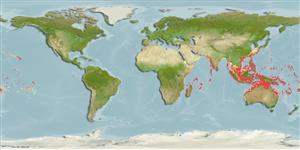分类 / Names
俗名 | 同种异名 | Catalog of Fishes(属, 种) | ITIS | CoL | WoRMS | Cloffa
Teleostei >
Acanthuriformes (Surgeonfishes)
鱸形目 (Surgeonfishes) >
Acanthuridae (Surgeonfishes, tangs, unicornfishes)
刺尾鯛科 (Surgeonfishes, tangs, unicornfishes) > Acanthurinae
Etymology: Acanthurus: Greek, akantha = thorn + Greek, oura = tail (Ref. 45335).
More on author: Cuvier.
Environment: milieu / climate zone / depth range / distribution range
生态学
海洋 礁区鱼类; 深度上下限 5 - 100 m (Ref. 28016), usually 5 - 45 m (Ref. 27115). 热带; 23°C - 28°C (Ref. 27115); 35°N - 35°S, 30°E - 137°W
Indo-Pacific: Red Sea south to Natal, South Africa and east to the Marquesas and Tuamoto islands, north to southern Japan, south to the southern Great Barrier Reef and New Caledonia.
印度-太平洋: 红海南至南非的纳塔尔而且东至马贵斯群岛与 Tuamoto 岛, 北至日本南部, 南至大堡礁与新加勒多尼亚的南方。
大小 / 重量 / 年龄
Maturity: Lm ? range ? - ? cm
Max length : 50.0 cm TL 雄鱼/尚未辨别雌雄; (Ref. 3145); 最大年龄: 23 年 (Ref. 52229)
背棘 (总数) : 9; 背的软条 (总数) : 24 - 26; 臀棘: 3; 臀鳍软条: 23 - 24. This species is distinguished by the following characters: body moderately deep and compressed, its depth 2.1-2.5 times in standard length or SL (smaller individuals are deeper-bodied); snout relatively short, 6-6.9 times in SL; eye 3.2-4.5 times in head length (at 12-28 cm SL); mouth small; teeth spatulate, close-set, with denticulate edges, and small for the genus; total gill rakers on first gill arch 13-15; continuous, unnotched dorsal fin IX,24-26; A III,23-24; caudal fin emarginate to lunate, concavity 6.5-9 times in SL (concavity is greater in larger individuals); caudal peduncle narrow, the least depth 10-12 times in SL with a lancet-like spine on each side which folds into a deep horizontal groove; stomach large, U-shaped, thin-walled with large, thorn-like papillae on inner surface; colour brown with longitudinal blue lines on head and body; a yellow area behind eye and 2 yellow bands extending anteriorly from eye; when alive, this fish is capable of changing its ground colour from dark brown to pale blue (Ref. 9808).
身体褐色; 头部有条纹的; 鳍褐色。 能够改变颜色到灰蓝色的整体。 在眼后面一个黄色的区域与 2 黄色的条纹延伸前面的从眼。 一,锐利地,朝向前面的在尾梗的两边上进入一个水平的凹槽之内摺叠下来的直立的硬棘; 在白色的鞘中棘。 鳃耙 13-15 在前面与后面的列中。 鳞片细小的。
Adults inhabit steep slopes, often in turbid waters, generally in the vicinity of coral reefs (Ref. 58652) or rocky bottoms. They form resident spawning aggregations (Ref. 27825, 48637). Adults often seen in schools, feeding mid-water on plankton (Ref. 48637). Feed on zooplankton. Marketed fresh. Flesh is almost never poisonous (Ref. 4795), but incidence of ciguatera poisoning was reported from Nauru I. (Ref. 125620). The retractile sharp blades of the caudal peduncle can be dangerous (https://www.monaconatureencyclopedia.com/acanthurus-mata-2/?lang=en, ver. 12/2021)
栖息于陡坡,常见于混浊的水域中, 通常在邻近珊瑚礁或岩石底部。 形成定居的产卵群集。 (参考文献 27825,48637) 成鱼常被见到成群, 在浮游生物上的进食中层水域.(参考文献 48637) 捕食浮游动物。 在市场上销售生鲜地了。 肉几乎从不是有毒的。 (参考文献 4795)
Life cycle and mating behavior
Maturities | 繁殖 | Spawnings | Egg(s) | Fecundities | 仔鱼
Form resident spawning aggregations (Ref. 27825).印度-太平洋: 红海南至南非的纳塔尔而且东至马贵斯群岛与 Tuamoto 岛, 北至日本南部, 南至大堡礁与新加勒多尼亚的南方。
Randall, J.E., 1987. Three nomenclatorial changes in Indo-Pacific surgeonfishes (Acanthurinae). Pac. Sci. 41(1-4):54-61. (Ref. 1921)
人类利用
渔业: 商业性; 水族馆: 商业性
工具
特别资料
下载 XML
网络资源
Estimates based on models
Preferred temperature (Ref.
123201): 24.7 - 29, mean 27.9 °C (based on 1918 cells).
Phylogenetic diversity index (Ref.
82804): PD
50 = 0.5000 [Uniqueness, from 0.5 = low to 2.0 = high].
Bayesian length-weight: a=0.02630 (0.01714 - 0.04036), b=2.94 (2.82 - 3.06), in cm total length, based on LWR estimates for this species & Genus-body shape (Ref.
93245).
营养阶层 (Ref.
69278): 2.5 ±0.25 se; based on food items.
Generation time: 5.0 ( na - na) years. Estimated as median ln(3)/K based on 1
growth studies.
回复力 (Ref.
120179): 低的, 最小族群倍增时间4.5 - 14 年 (K=0.219; tmax=23).
Fishing Vulnerability (Ref.
59153): Moderate vulnerability (39 of 100).
Nutrients (Ref.
124155): Calcium = 38.8 [15.8, 103.9] mg/100g; Iron = 0.604 [0.236, 1.442] mg/100g; Protein = 18.3 [17.1, 19.5] %; Omega3 = 0.107 [0.050, 0.221] g/100g; Selenium = 22.2 [8.0, 61.9] μg/100g; VitaminA = 40.8 [10.3, 147.2] μg/100g; Zinc = 2.28 [0.72, 4.04] mg/100g (wet weight); based on
nutrient studies.
